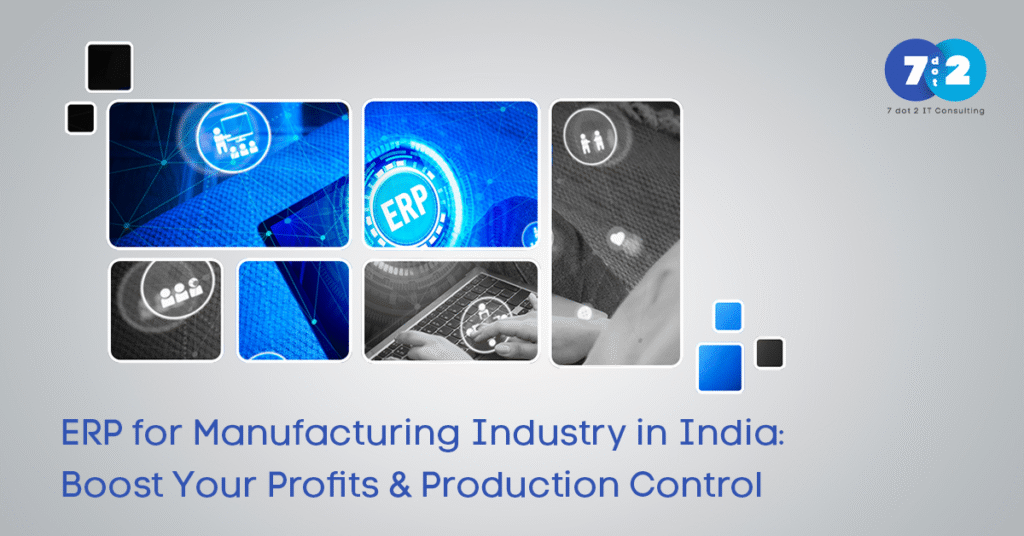ERP for Manufacturing Industry in India: Boost Your Profits & Production Control
Posted on : 01 Aug 2025 at 17:29 pm, by Puneet Aggarwal, Founder 7 dot 2 IT Consulting

In today’s competitive manufacturing landscape, efficiency and accuracy are two key ways to profitability. For Indian manufacturers facing complex supply chains, fluctuating demand, and rising costs, Enterprise Resource Planning (ERP) systems have emerged as a decisive strategy to boost profits and gain better overall business control, including production management. From small-scale units to large industrial setups, adopting an ERP system can transform operations by streamlining processes and enabling smarter decision-making.
In this blog, we explore what an ERP system is, why it’s crucial for the manufacturing industry in India, and how it directly impacts profitability and business management across functions.
What is an ERP System?
An Enterprise Resource Planning (ERP) system is a centralized platform that integrates core business processes such as production planning, inventory management, supply chain coordination, finance, sales, and quality control into a single unified system.
Instead of juggling multiple disconnected tools, manufacturers can access real-time data across departments, ensuring that every decision is backed by accurate, up-to-date information.
Why ERP is a Game-Changer for the Manufacturing Industry in India
The Indian manufacturing sector is evolving rapidly under the influence of Industry 4.0, global supply chain shifts, and government initiatives like Make in India. In this dynamic ecosystem, an ERP software solution isn’t just an upgrade but a competitive necessity.
Let’s explore how ERP solutions can supercharge both profits and production control.
1. Increased Productivity through Automation: ERP systems with production modules automate repetitive and time-consuming tasks like work order creation, scheduling, and inventory tracking. This automation:
i) Minimizes manual intervention
ii) Speeds up production cycles
iii) Reduces labour costs
By freeing up human resources from routine tasks, companies can focus more on innovation and meeting customer demands which are a direct path to higher profitability.
2. Real-Time Operational Visibility: An ERP system provides end-to-end visibility into operations, from raw material procurement to finished product delivery. Benefits include:
i) Tracking production status in real-time
ii) Monitoring inventory levels accurately
iii) Identifying bottlenecks early
This transparency allows managers to make quick adjustments and maintain smooth workflows, which is crucial for both production and overall business management.
3. Cost Reduction and Waste Minimization: An ERP system helps manufacturers:
i) Optimize resource allocation (materials, labour, and equipment)
ii) Minimize wastage of raw materials
iii) Reduce rework due to improved quality control
Lower costs not only improve margins but also make products more competitive in both domestic and international markets.
4. Data-Driven Decision Making: With real-time analytics and advanced reporting features, an ERP solution enables:
i) Forecasting demand more accurately
ii) Planning production schedules effectively
iii) Responding quickly to market changes
Instead of relying on guesswork, managers can base their strategies on actionable insights, enhancing both efficiency and profitability.
5. Strengthened Supply Chain Management: ERP software solutions integrate seamlessly with supply chain operations. This leads to:
i) Better coordination with suppliers
ii) Reduced lead times
iii) Improved inventory turnover
By enhancing supplier relationships and optimizing procurement, ERP ensures that production lines run without costly delays.
6. Better Quality Control: Quality control is embedded into modern ERP solutions, allowing for:
i) Real-time quality checks during production
ii) Standard compliance tracking
iii) Faster defect detection and resolution
Consistently high product quality boosts brand reputation and customer trust, which translates into sustained profitability.
7. Simplified IT and Process Management: Instead of managing multiple standalone applications, an ERP system consolidates everything into one platform. This reduces IT complexity, lowers maintenance costs, and ensures consistent workflows across departments.
How to Choose the Best ERP for Manufacturing Industry in India
While the benefits are clear, selecting the best ERP for manufacturing industry depends on factors like company size, budget, scalability, and specific industry needs. Look for features such as:
i) Robust inventory, supply chain, and production-specific modules
ii) Integration with IoT and automation tools
iii) User-friendly dashboards and mobile access
iv) Compliance with Indian tax and regulatory requirements.
Conclusion
The Indian manufacturing sector is entering a new era where operational efficiency, data-driven strategies, and real-time control will decide market leaders. Implementing an ERP for manufacturing industry in India is more than a technological upgrade, it’s a strategic move to boost profits, sharpen production control, and secure long-term competitiveness.
By streamlining processes, reducing costs, and enabling informed decision-making, ERP solutions empower manufacturers to thrive in an increasingly challenging business landscape. The sooner you integrate ERP into your operations; the sooner you’ll unlock its full potential for growth.
At 7 dot 2 IT Consulting, we are committed to empowering the manufacturing industry in India with cutting-edge ERP solutions, helping businesses unlock higher productivity, stronger production management, and long-term profitability.
